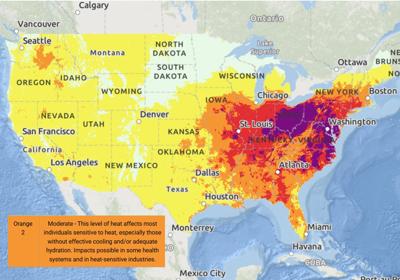There is an extreme heat wave affecting most of the United States this week. According to the National Weather Service, the majority of Alabama is at moderate risk of heat related impact.
FEMA also released a list of reminders to consider for extreme heat safety during this heat wave. According to the press release, it's important to understand your risk and hazard. Summer heat can be especially dangerous for older adults, those who work outside, people with certain health conditions and those without access to air conditioning. It’s important to recognize the signs of heat exhaustion, heat cramps, heat stroke and ways to respond.
While all heat-related illnesses can require medical attention, heat stroke is always a medical emergency. If you experience — or notice someone else experiencing the symptoms of heat stroke, call 9-1-1 and get the person to a cooler place right away.
Another reminder is to keep everyone safe. Never leave children or pets alone in hot vehicles. Heat can rise in a car up to 20 degrees in just 10 minutes. It is important to check on family, friends and neighbors who do not have air conditioning and who spend much of their time alone.
There are also a number of ways to stay cool. However, fans alone aren’t enough in high heat and high humidity. FEMA encourages people and especially those that are vulnerable to go somewhere with air conditioning or visit a public place like the library, museum or shopping mall to stay cool.
Other ways to keep cool include wearing lightweight, loose-fitting clothing, taking a cool shower or bath to cool off and if you are at home, keep curtains closed to keep the heat out.
Also remember to stay hydrated. Drink plenty of water even if you do not feel thirsty and avoid drinks with caffeine. If you have epilepsy or heart, kidney or liver disease, are on fluid-restricted diets or have a problem with fluid retention consult a doctor before increasing liquid intake.
Lastly, check the air quality of your area as hot weather can make air quality worse. Poor air quality can be especially dangerous for people with heart or lung disease, older adults and children.
You can enter your zip code on the AirNow.gov page to get air quality data where you live.

